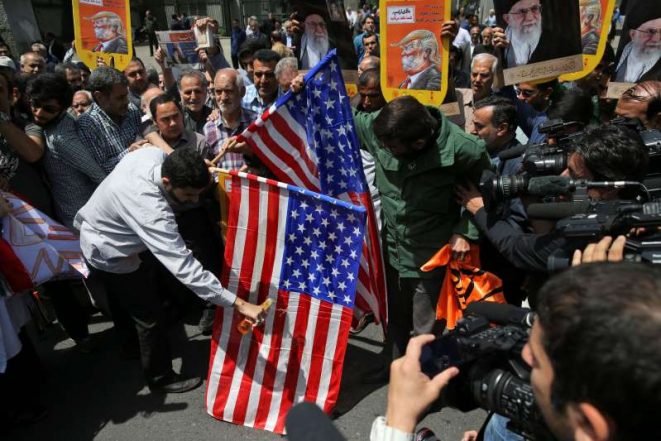
Iran Cleric Threatens Destruction Of Israeli Cities
A prominent Iranian cleric on Friday threatened two Israeli cities with destruction if the Jewish state “acts foolishly” and attacks its interests again, while thousands of protesters demonstrated against President Donald Trump’s withdrawal from the Iranian nuclear deal with world powers.
The comments by Ayatollah Ahmad Khatami followed a week of escalating tensions that threaten to spill over into a wider conflict between the two bitter enemies, who have long fought each other through proxies in Syria and Lebanon.
Israeli airstrikes struck Iranian military installations inside Syria on Thursday — its biggest coordinated assault on Syria since the 1973 Mideast war — in retaliation for an Iranian rocket barrage on Israeli positions in the occupied Golan Heights. It was the most serious military confrontation between the two rivals to date.
Khatami, who has echoed sentiments of Supreme Leader Ali Khamenei who says Israel will not exist in 25 years, said the Jewish state could face destruction if it continues to challenge Iran.
“The holy system of the Islamic Republic will step up its missile capabilities day by day so that Israel, this occupying regime, will become sleepless and the nightmare will constantly haunt it that if it does anything foolish, we will raze Tel Aviv and Haifa to the ground,” he said, according to state television.
His remarks drew chants of “Death to America!” from those gathered for Friday prayers in Tehran.
Thousands later demonstrated across the country to protest Trump’s withdrawal from the nuclear deal. The protests resembled other aggressive but orderly gatherings typical under President Hassan Rouhani, who has portrayed himself as seeking rapprochement with the West and is simultaneously trying to save the nuclear deal with world powers while attempting to appease hard-liners seeking revenge for Israeli attacks.
In a lengthy government statement on Friday, the Iranian government warned that it would take “whatever reciprocal measures it deems expedient” if it is not fully compensated for the U.S. withdrawal from the nuclear agreement as provided for in the accord.
It called on the other parties to the agreement — especially Britain, France and Germany — to safeguard the accord, adding that no provisions or timeframes in the 2015 agreement “are negotiable in any manner.”
At the same time, the government said it has tasked the president of the Atomic Energy Organization of Iran with “taking all necessary steps in preparation for Iran to pursue industrial-scale enrichment without any restrictions.”
After Trump announced the U.S. withdrawal from the deal on Tuesday, Rouhani warned that Iran would resume uranium enrichment at an even higher rate if the accord collapses. He ordered Foreign Minister Mohammad Javad Zarif to negotiate with the countries still in the deal to try to save it, and Friday’s statement reiterated that Zarif was seeking “required guarantees” from the five other parties to the agreement.
The 2015 nuclear deal imposed restrictions on the Islamic Republic’s nuclear program in return for the lifting of most of the U.S. and international sanctions against Tehran.
However, the deal came with time limits and did not address Iran’s ballistic missile program or its regional policies. Trump has repeatedly pointed to those omissions in referring to the accord as the “worst deal ever.” However, proponents of the deal have said those time limits were meant to encourage more discussion with Iran in the future.
On Friday, France urged Europeans to stand up to Trump over the nuclear deal and not act as “vassals,” as the EU scrambles to find ways to save the accord and the billions of dollars in trade it unleashed.
French Finance Minister Bruno Le Maire said on Europe-1 radio that Europe should not accept that the U.S. is the “world’s economic policeman.”
“Do we want to be vassals who obey decisions taken by the United States while clinging to the hem of their trousers?” Le Maire asked. “Or do we want to say we have our economic interests, we consider we will continue to do trade with Iran?”
European governments tried for months to persuade Trump to stick with the deal but failed, and now fear it will raise the risk of conflict in the region. Aside from the mounting military tensions between Iran and Israel, oil prices are rising on the uncertainty.
Russian President Vladimir Putin and German Chancellor Angela Merkel spoke Friday and underlined their aim of preserving the deal and peace in the Mideast. And European Union foreign policy chief Federica Mogherini insisted that it’s not up to the U.S. to determine the deal’s future anyway.
“This deal is not a bilateral treaty. It’s a UN Security Council Resolution and it belongs to the entire world,” said Mogherini, who will chair talks Tuesday with the British, French, German and Iranian foreign ministers in Brussels.






